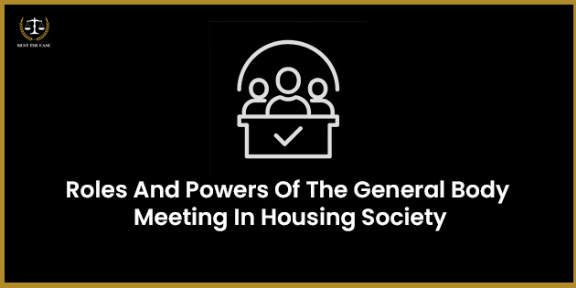Know The Law
Role And Powers Of The General Body Meeting In Housing Society

Have you ever joined your housing society’s meetings but felt confused about who really makes the important decisions or what your actual rights are? Many flat owners and residents face the same confusion. In India, the General Body Meeting (GBM) stands as the cornerstone of governance in Cooperative Housing Societies (CHS). It serves as the primary platform where members collectively make decisions that shape the functioning and future of their community. Understanding the role and powers vested in the GBM is crucial for every member to ensure active participation, where members come together to discuss, vote, and decide how the society will run.
Here you will learn:
- What actually happens in a General Body Meeting (GBM) of a housing society?
- What powers and rights do members have under the law?
- Why does your participation matter in decision-making?
- Key legal updates and changes in cooperative housing society law.
What Is the General Body Meeting (GBM)?
A General Body Meeting (GBM) is a meeting where all members of a housing society come together to discuss important issues and make decisions. Think of it as the highest decision-making body of society. Whatever is decided in this meeting is final, as long as it follows the Maharashtra Cooperative Societies Act, 1960, and the society’s own rules (bye-laws). It is like the highest authority in the society; no other group (not even the committee) can overrule it.
This authority comes from Section 72 of the Maharashtra Co-operative Societies Act, 1960, which clearly says that the final power of the society lies with the general body of members in a properly held meeting.
Powers of The General Body Meeting in Housing Societies
The General Body Meeting (GBM) is the backbone of decision-making in any housing society. Every major rule, expense, and project must pass through this meeting, giving members the ultimate authority and ensuring transparency, fairness, and harmony.
The General Body Meeting (GBM) is the boss of the housing society. It has the final say on all important matters.
Here are its key powers, explained simply:
- Final Decision Maker: It is the highest authority. The elected committee must always follow the decisions made by the GBM.
- Approving Money: It checks and must approve how your maintenance money was spent last year (accounts) and how it will be spent next year (budget).
- Saying Yes to Big Spending: It must give permission for any large project or expensive purchase, like major repairs, new lifts, or planning for redevelopment.
- Electing Leaders: It votes to choose the members who will be on the managing committee.
- Changing Rules: It can vote to change the society's basic rules (bye-laws).
- Solving Fights: It acts as the first place for members to talk about and solve common disputes.
Recent Case Laws on General Body Meetings in Housing Societies
Understanding the latest court judgments helps society members know their rights and responsibilities during General Body Meetings (GBMs). These rulings clarify common issues like committee disqualification, redevelopment approvals, and the power of majority decisions in housing societies.
The Bombay High Court quashed the Disqualification Order
Harish Arora & Ors. v. The Deputy Registrar of Co-operative Societies
- Case Summary: The petitioners challenged the disqualification of the managing committee members under Section 79A(3) of the Maharashtra Co-operative Societies Act. They contended that the guidelines issued under Section 79A were directory and not mandatory.
- Court's Decision: The Bombay High Court quashed the disqualification order, emphasizing that non-compliance with the 2019 Government Resolution did not automatically lead to disqualification. The court noted that the guidelines were directory in nature and that the managing committee had substantially complied with the procedures.
Conclusion
The General Body Meeting (GBM) is the highest authority in your Cooperative Housing Society (CHS), making it the most critical event for all residents. This meeting is where flat owners exercise their ultimate power: approving the annual budget, scrutinizing financial transparency, electing the Managing Committee, and voting on essential motions like society redevelopment and bye-law amendments. Your active participation in the GBM is key to ensuring good governance and accountability in your community. Simply put, understanding your GBM rights and attending these meetings is the most effective way to protect your investment and secure the smooth functioning of your housing society.
Frequently Asked Questions
Q1. What is the General Body Meeting (GBM), and why is it important?
The GBM is the meeting where all members of a housing society come together. It is the highest decision-making authority of the society (as per Section 72 of the Maharashtra Co-operative Societies Act, 1960), and no other body, including the Managing Committee, can overrule its decisions, provided they are compliant with the law and society bye-laws.
Q2. What major powers does the General Body Meeting have?
The GBM holds the ultimate authority for: (1) Approving the society’s annual accounts and budget. (2) Electing the members of the Managing Committee (who handle day-to-day work). (3) Approving major expenses and projects (like redevelopment, major repairs, or new installations). (4) Approving amendments (changes) to the society's bye-laws (requires a two-thirds majority and the registrar's approval). (5) Resolving certain disputes among members.
Q3. What is the difference between the General Body Meeting (GBM) and the Managing Committee?
The GBM is the supreme authority where all members vote on major policies, rules, and finances. The Managing Committee is a smaller, elected group that manages the day-to-day affairs of the society (collecting charges, managing services) but must always work under the control of and follow the decisions made by the GBM.
Q4. How are major decisions like redevelopment or large projects approved?
The Managing Committee cannot approve large financial decisions alone. All major projects (like redevelopment, major repairs, or installing new equipment) must first be brought before the GBM and require the majority approval of the members present to ensure transparency and prevent misuse of funds.
Q5. Can the society's rules (bylaws) be changed, and what is the process?
Yes, the bylaws can be changed. As per Section 13 of the Act, any proposed change must be: (1) Approved by at least two-thirds of the members present in the GBM. (2) Sent to the Registrar of Co-operative Societies for official approval before they become legally valid.






